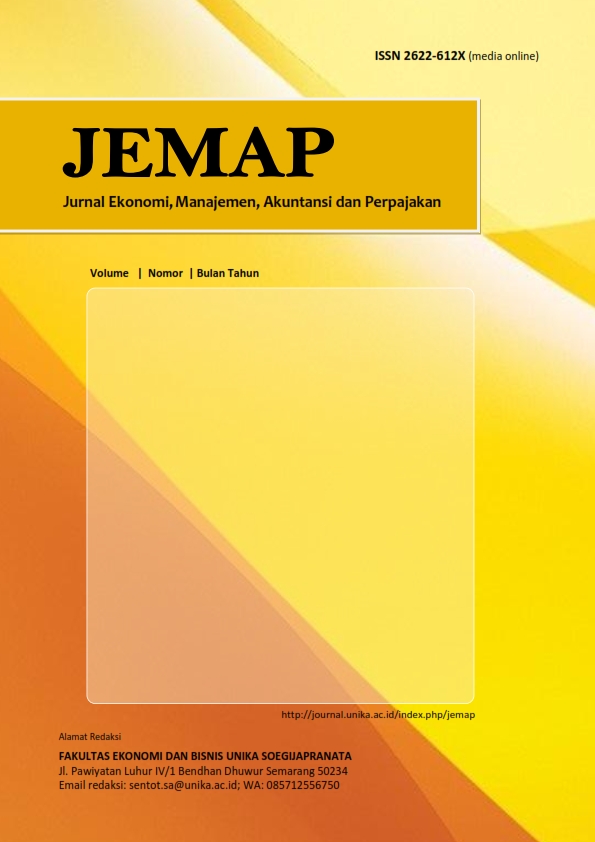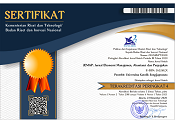Pengaruh Norma Dan Faktor Sosio-Ekonomi Terhadap Tax Morale Dengan Tingkat Pendidikan Sebagai Variabel Pemoderasi
Abstract
The puspose of this study is to analyze the impact of personal and social norms on tax morale with educational level as moderating variable. This study uses 150 taxpayers in Jabodetabek as respondents. This quantitative research is using the Partial Least Square-Structural Equation Modelling (PLS-SEM) method to process the data and SmartPLS software. The results of this study indicate that social norm (patriotism) has a positive and significant effect on tax morale, personal norm (religiosity) has a positive effect on tax morale too but insignificant. On the other hand, all socio-economic variables in this research show no significant effect on tax morale. Educational level, as moderating variable, also shows no significant effect and categorized as homologiser moderation. Based on these conclusions, one thing that can be taken into consideration by DJP is to ask religious leaders for help to socialize tax regulations to improve the tax compliance.
Keywords
Full Text:
PDF (Bahasa Indonesia)References
Allingham, M. G., & Sandmo, A. (1972). Income tax evasion: a theoretical analysis. Journal of Public Economics, 1(3), 323–338. https://doi.org/https://doi.org/10.1016/0047-2727(72)90010-2
Astrawan, I. W. G., Nuridja, I. M., & Dunia, I. K. (2014). Analisis Sosial-Ekonomi Penambang Galian C di Desa Sebudi Kecamatan Selat Kabupaten Karangasem Tahun 2013. Jurnal Pendidikan Ekonomi Undiksha, 4(1). https://doi.org/http://dx.doi.org/10.23887/jjpe.v4i1.1906
Basri, Y. M., & Al Azhar, A. A. (2017). Anteseden dan Konsekuensi Moral Pajak (Studi Pada Wajib Pajak Orang Pribadi di Kota Pekanbaru). JIAFE (Jurnal Ilmiah Akuntansi Fakultas Ekonomi), 3(2), 61–75. https://doi.org/10.34204/jiafe.v3i2.760
Benno Torgler. (2003). Tax Morale: Theory and Empirical Analysis of Tax Compliance. PhD Thesis, 1–668.
Cahyonowati, N. (2011). Model Moral Dan Kepatuhan Perpajakan. Jaai, 15(2), 161–177.
Cialdini, R. B., & Trost, M. R. (1998). Social influence: Social norms, conformity and compliance. In The handbook of social psychology, Vols. 1-2, 4th ed. (pp. 151–192). McGraw-Hill.
Deci, E. L., & Ryan, R. M. (2010). Intrinsic Motivation. In The Corsini Encyclopedia of Psychology (pp. 1–2). https://doi.org/https://doi.org/10.1002/9780470479216.corpsy0467
Fowler, F. (2018). Survey Research Methods (5th edition) (5th Editio). SAGE Publications, Inc. https://doi.org/9781483312408
Frey, B. S. (1999). Economics as a science of human behaviour: Towards a new social science paradigm. In Angewandte Chemie International Edition. Springer Science & Business Media.
Hair, J. F., Hult, G. T. M., & Ringle, C. M. (2017). A Primer on Partial Least Squares Structural Equation Modeling (PLS-SEM) (Second Edi). SAGE Publications, Inc.
Hidayat, D. S. (2017). Djarot: Jakarta Itu Miniatur Indonesia, Tak Usahlah Pindahkan Ibu Kota. https://www.jawapos.com/metro/metropolitan/31/07/2017/djarot-jakarta-itu-miniatur-indonesia-tak-usahlah-pindahkan-ibu-kota/
Horodnic, I. A. (2018). Tax morale and institutional theory: a systematic review. International Journal of Sociology and Social Policy, 38(9–10), 868–886. https://doi.org/10.1108/IJSSP-03-2018-0039
Huber, S., & Huber, O. (2012). The Centrality of Religiosity Scale (CRS). Religions, 3, 710–724. https://doi.org/10.3390/rel3030710
ISSP. (2015). International Social Survey Programme: National Identity III - ISSP 2013International Social Survey Programme: National Identity III - ISSP 2013. GESIS Data Archive. https://doi.org/https://doi.org/10.4232/1.12312
Jimenez, P., & Iyer, G. S. (2016). Tax compliance in a social setting: The influence of social norms, trust in government, and perceived fairness on taxpayer compliance. Advances in Accounting, 34, 17–26. https://doi.org/10.1016/j.adiac.2016.07.001
Keuangan, K. (n.d.). APBN 2020. Retrieved April 28, 2021, from https://www.kemenkeu.go.id/single-page/apbn-2020/
Konrad, K. A., & Qari, S. (2012). The Last Refuge of a Scoundrel? Patriotism and Tax Compliance. Economica, 79. https://doi.org/10.1111/j.1468-0335.2011.00900.x
Lago-Peñas, I., & Lago-Peñas, S. (2010). The determinants of tax morale in comparative perspective: Evidence from European countries. European Journal of Political Economy, 26(4), 441–453. https://doi.org/10.1016/j.ejpoleco.2010.06.003
Lewis, A. (1982). The social psychology of taxation. British Journal of Social Psychology, 21(2), 151–158. https://doi.org/10.1111/j.2044-8309.1982.tb00523.x
Luttmer, E. F. P., & Singhal, M. (2014). Tax morale. Journal of Economic Perspectives, 28(4), 149–168. https://doi.org/10.1257/jep.28.4.149
Macionis, J. J. (2018). Sosiology (Sixteenth edition (ed.)).
McGee, R. (2012). The Ethics of Tax Evasion: Perspectives in Theory and Practice. In R. McGee (Ed.), Business and Society Review (1st ed., Vol. 116, Issue 3). Springer. https://doi.org/https://doi.org/10.1007/978-1-4614-1287-8
OECD. (2019). Tax Morale: What Drives People and Businesses to Pay Tax? In Tax Morale. OECD Publishing. https://doi.org/10.1787/f3d8ea10-en
Peters, R. S. (1977). Education and the education of teachers: International library of the philosophy of education. Routledge & Kegan Paul Ltd. https://doi.org/10.4324/9780203861066
Rodriguez-Justicia, D., & Theilen, B. (2018). Education and tax morale. Journal of Economic Psychology, 64(October), 18–48. https://doi.org/10.1016/j.joep.2017.10.001
Sá, C., Martins, A., & Gomes, C. (2014). Tax morale, Occupation and Income Level: An Analysis of Portuguese Taxpayers. Journal of Economics, Business and Management, 112–116. https://doi.org/10.7763/joebm.2014.v2.108
Susila, B., Juniult, P. T., & Hidayat, A. (2017). Wajib Pajak dan Generasi Muda : Tax Morale Mahasiswa di Indonesia Taxpayers and Young Generation : Tax Morale of Indonesian College Students Pendahuluan Tinjauan Literatur Definisi Tax Morale. Jurnal Ekonomi Dan Pembangunan Indonesia, 16(2), 154–172. https://doi.org/http://dx.doi.org/10.21002/jepi.v16i2.601
Torgler, B. (2005). Tax Morale in Latin America. Public Choice, 122(1/2), 133–157. http://www.jstor.org/stable/30026676
Torgler, B. (2006). The importance of faith: Tax morale and religiosity. Journal of Economic Behavior and Organization, 61(1), 81–109. https://doi.org/10.1016/j.jebo.2004.10.007
Torgler, B., & Murphy, K. (2004). Tax morale in Australia : what shapes it and has it changed over time? Journal of Australian Taxation, 7(2), 298–335.
Torgler, B., & Schneider, F. (2005). Attitudes Towards Paying Taxes in Austria: An Empirical Analysis. Empirica, 32(2), 231–250. https://doi.org/10.1007/s10663-004-8328-y
Vogel, J. (1974). Taxation And Public Opinion In Sweden: An Interpretation Of Recent Survey Data. National Tax Journal, 27(4), 499–513. http://www.jstor.org/stable/41861983
Wenzel, M. (2004). An analysis of norm processes in tax compliance. Journal of Economic Psychology, 25(2), 213–228. https://doi.org/10.1016/S0167-4870(02)00168-X
Peraturan Pemerintah Nomor 26 Tahun 2008 tentang Rencana Tata Ruang Wilayah Nasional
Surat Edaran Menteri PANRB Nomor 41 Tahun 2019 tentang Kewajiban Penyampaian Surat Pemberitahuan Tahunan Pajak Penghasilan Wajib Pajak Orang Pribadi oleh Aparatur Sipil Negara/Prajurit Tentara Nasional Indonesia/Anggota Kepolisian Negara Republik Indonesia melalui e-Filing
Kementerian Keuangan Republik Indonesia. (Maret 2019). Mengejar Lompatan Rasio. Media Keuangan. https://www.kemenkeu.go.id/media /11884/media-keuangan-maret-2019.pdf
Laporan Tahunan Direktorat Jenderal Pajak Tahun 2019
DOI: https://doi.org/10.24167/jemap.v6i1.4065
Refbacks
- There are currently no refbacks.
e-ISSN 2622-612X | View My Stats







